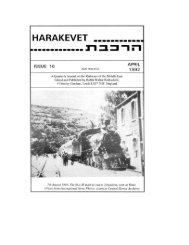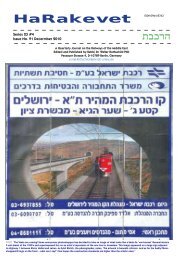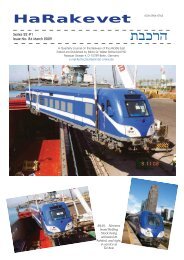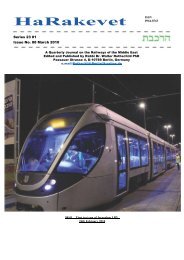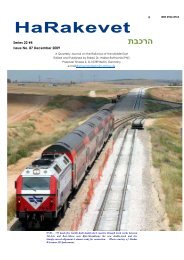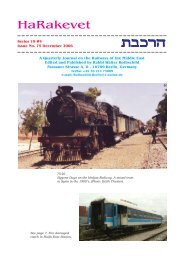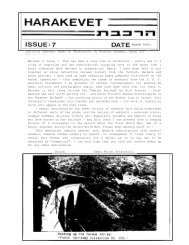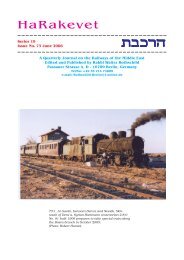Issue 72 - HaRakevet
Issue 72 - HaRakevet
Issue 72 - HaRakevet
You also want an ePaper? Increase the reach of your titles
YUMPU automatically turns print PDFs into web optimized ePapers that Google loves.
<strong>72</strong>:02.<br />
EDITORIAL.<br />
“There are railroads... whose<br />
officers are not so much pleased as they<br />
are outraged that ‘outsiders’ should be<br />
fascinated by their art and mystery and<br />
who attempt to preserve the details of<br />
valve motion, automatic signalling and<br />
train despatching in a manner positively<br />
Druidical. Photographs showing smoke<br />
exhaust have been known to produce<br />
symptoms bordering on those of epilepsy.<br />
A menace to the safety of state<br />
and nation has been seen by many a<br />
special officer in a camera pointed at a<br />
peddler freight setting out cars of company<br />
coal on lonely sidings in Nebraska<br />
and Oklahoma, and it is a satisfaction<br />
to the author that several of his own<br />
shots in this book were made in defiance<br />
of such preposterous Dogsberrys.”<br />
(Lucius Beebe in “Trains in Transition”,<br />
D. Appleton-Century Co., 1941, repub.<br />
Hawthorn, NY. p. 6.)<br />
Beebe describes a state of mind<br />
- one shared by many security guards<br />
in Israel. The Editor spent a very busy<br />
three days in Israel in December, attending<br />
a conference and doing some<br />
travelling, and was met almost everywhere<br />
with the now-famous words<br />
“Assur Letzalem!!”. Two high (or low)<br />
points that need to be presented here<br />
were:-<br />
(a). An encounter on the platform<br />
at Jerusalem Malcha station; On<br />
walking to the end of the platform to<br />
get a picture, I was confronted by a<br />
busybody lady with the accusation that<br />
I had just walked onto the station without<br />
buying a ticket. Then, although I had<br />
Sybil Ehrlich (an Israeli journalist) with<br />
me, together with a copy of ‘Harakevet’<br />
showing photographs of the very same<br />
station under construction (!), two further<br />
guards were called. We were harangued,<br />
but pointed out that there is<br />
no sign anywhere that states that photography<br />
is prohibited (Israel does have<br />
plenty of signs pointing out where carrying<br />
weapons, or smoking, or parking<br />
are not allowed). We then boarded the<br />
waiting train, but the guards then came<br />
on, walkie-talkies blaring, and proceeded<br />
to take us off the train (which<br />
then departed) and bring us to the Station<br />
Master (Menahel HaTachanah).<br />
Here everything was resolved, but only<br />
because he happened to be a personal<br />
friend of Sybil, my companion. Fortunately,<br />
the days when there was only<br />
one train a day to Tel Aviv are now past,<br />
but even so we had an unexpected and<br />
unwanted hour-long wait on a darkening<br />
station.<br />
(b). Sitting on the night-time train<br />
Page 2<br />
to the airport, I made notes in a notebook<br />
as to where we stopped, when,<br />
and how many passengers got on. The<br />
security guard wanted to know why I<br />
was making such notes, demanded my<br />
passport, ticket and almost a letter confirming<br />
my circumcision, (Certainly they<br />
are always interested to know if one is<br />
Jewish) and nearly took the notebook.<br />
What do we learn from this? It<br />
is not just that Israel is a nation under<br />
constant risk from suicide bombings -<br />
one can appreciate that truly suspicious<br />
behaviour might arouse attention. But<br />
then, anyone out of the ordinary is suspicious<br />
in Israel - which is strange, since<br />
it is such a complex and multicultural<br />
society. If one does not want to arouse<br />
suspicion on an Israeli train one must<br />
try (a) to be in some kind of uniform,<br />
and sprawled over the table asleep, or<br />
(b) wearing sunglasses (oddly, this<br />
makes one appear sinister in every<br />
other country - but in Israel it is people<br />
without sunglasses who are sinister), or<br />
(c), if female, chattering constantly on<br />
a Cellphone. One must never look out<br />
of the window, and it is “uncool” to show<br />
any interest in the outside world around<br />
one - one must remain in one’s own<br />
darkened i-Podded existence.<br />
Many of these guards are poorly<br />
paid by private contractors and live<br />
fairly tedious existences - so one can<br />
understand, should they approach and<br />
ask what one is doing, walking around<br />
a building or photographing a wagon.<br />
But one would think that providing evidence<br />
of one’s identity, and one’s interest<br />
in a subject (such as magazines<br />
or other photos), would be enough. At<br />
least one Israel tour guide now bawls<br />
out such busybodies and refuses to be<br />
intimidated. The Public Relations Officer,<br />
Benny Na’or, continues to affirm<br />
that Permits for Photography are not<br />
needed - technically, he is correct, but<br />
bitter and repeated experience by several<br />
railway enthusiasts, Israelis and<br />
others, demonstrate that this is not<br />
enough. Be warned, and be prepared<br />
to argue back, and to mention his<br />
name.<br />
The Editor apologises for this tirade,<br />
but the situation has really become<br />
ridiculous. On the other hand, in<br />
other areas much progress has been<br />
and continues to be made. See further<br />
inside this issue! “It is a satisfaction to<br />
the author that several of his own shots<br />
in this book were made in defiance of<br />
such preposterous Dogsberrys”.<br />
It should be noted that immediately<br />
after the last issue went to the<br />
printer, a whole batch of news from<br />
Aharon Gazit and others arrived, and<br />
,cfrv<br />
,cfrv<br />
the new timetable commenced. Unfortunate<br />
but, that’s the way it is.<br />
And now to other matters. Whilst<br />
there is so much to write from Israel,<br />
and more every few days thanks to<br />
Aaron, Sybil, Paul and others, it looks<br />
on the other hand as though there will<br />
in future be fewer and fewer things to<br />
report from the Hedjaz lines, which are<br />
now on their last legs if not their last<br />
wheels. We bring some recent accounts<br />
of visits. It is noticeable, looking back<br />
over the coverage of the Hedjaz line in<br />
this and several other magazines, that<br />
almost all reports are ‘unofficial’, from<br />
tour groups or individual travellers. We<br />
do not get official press releases or any<br />
information as to the real planning or<br />
the reasons for the real daily operations.<br />
For example, Who decided, when the<br />
tracks were cut, to concentrate some<br />
locomotives and stock on the isolated<br />
former Serghaya line, where there are<br />
no workshop or even depot facilities? It<br />
is only a matter of time until a repair is<br />
needed that requires more than a hammer<br />
and a spanner, and then these services<br />
will cease. Come to that, who decided<br />
to cut the line, and how much<br />
notice (or influence) did the Railways<br />
Administration have? Such issues can<br />
be important, when one considers that<br />
the line was considered for years to be<br />
a ‘Waqf’, a religious foundation. Who<br />
has been paying, and continues to pay<br />
railway staff to sit in stations which see<br />
no trains for five days a week on a railway<br />
with virtually no traffic income?<br />
Who closed down the only (and not very<br />
remarkable or frequent) suburban<br />
dieselised railway service into a fastgrowing<br />
and overpopulated and congested<br />
city? Who makes decisions at the<br />
Ministry of Transport? From a purely<br />
commercial point of view, it would now<br />
make sense for the Syrian Government<br />
(if it is acting as steward for the line)<br />
simply to sell all the remaining locos<br />
and stock to foreign railway preservation<br />
societies, and perhaps erect a static<br />
museum at Cadem works with the remaining<br />
hulks either sold or cosmetically<br />
restored.<br />
A final point. This issue was<br />
slightly delayed due to computer problems.<br />
The result is that even more News<br />
from the Line has come in, due partly<br />
to the sheer amount of activity but also<br />
to this delay. There is more than would<br />
be the case had we gone to press a<br />
month ago, and this has squeezed<br />
some historical items out. The balance<br />
will be restored next time.<br />
Enjoy!<br />
The Editor.



